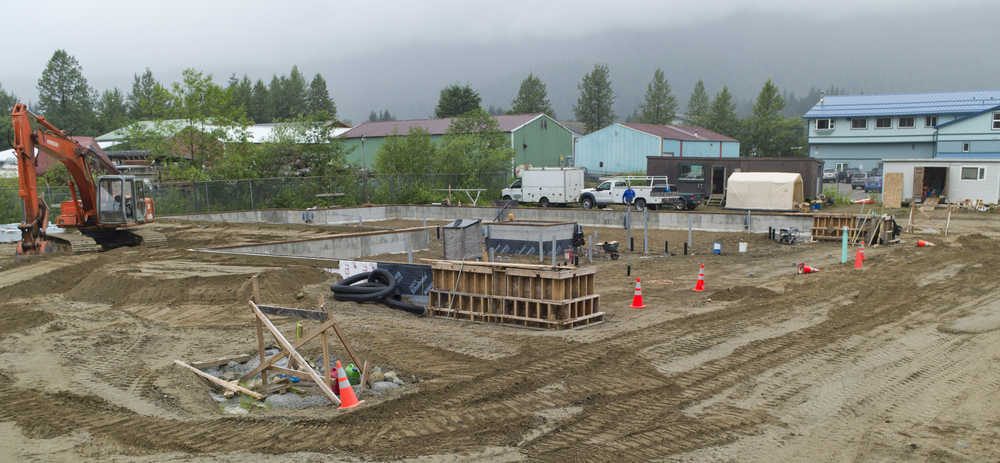As construction of the Juneau Housing First project moves steadily along, its board of directors is still waiting for funding to come through.
The project broke ground in May on Allen Court in Lemon Creek. The project’s foundation is just about complete. Soon, exterior walls will go up.
“The only issue that we have right now is we’re a little shy on total budget amounts that we needed,” said Steve Sorensen, board president of the Juneau Housing First Collaborative, by phone Friday.
“We’re shy about a half a million, but we’re looking for other sources of money to make up that difference,” he said.
The 32-unit housing project will cater to Juneau’s chronically homeless population, providing housing and resources without the caveat of sobriety. Anchorage and Fairbanks already have such housing.
“We have enough money to proceed through September, but it’s the last bit of money that we need to get this project completed by December so we can get the people moved in and off the streets before the dead of winter moves in,” Sorensen said.
Each winter for the past few years, people have died on Juneau’s streets.
Sorensen said the funding shortage comes from a couple of things. Earlier this month, the project received a $500,000 grant from the Rasmuson Foundation, which the Collaborative is extremely thankful for. But it was short of the $850,000 that was requested, Sorensen said.
“That additional money would’ve paid for the Front Street Clinic addition, so that’s still money we’re looking for. It would allow Front Street Clinic to move out there and provide services for the people there,” he said.
The rest of the hole comes from a missing federal Indian Community Development Block Grant. The collaborative could not secure a partner needed to get the grant.
“So that was another source of monies that we were counting on but couldn’t get,” Sorensen said.
Despite the $500,000 gap, the project has made substantial progress in the funding arena.
Since receiving $3 million from the Alaska Housing Finance Corporation, $1.5 million from the City and Borough of Juneau, and land from Tlingit-Haida Regional Housing Authority, the Collaborative has also gotten funding from the Alaska Mental Health Trust Authority, the Juneau Community Foundation and the recent Rasmuson Foundation grant.
This has allowed the Collaborative to use $1.8 million in bridge financing CBJ appropriated for the project last year.
The financing was a funding mechanism to allow the Collaborative to proceed with construction while waiting for other grants. As funding comes in, CBJ’s financial responsibility lessens.
CBJ finance director Bob Bartholomew said the city’s bridge financing is now around $900,000.
“Our risk has been cut in half, so that’s good,” he said on the phone Friday.
Neither the city nor the Collaborative expects the money to be tapped, but if necessary, the funding is there.
“That was the intent of the Assembly — if that’s what it took to make this project happen, then that’s what we would do, and I think (the Collaborative has) been making a good-faith effort of what they said they’d do, which is pursuing all available avenues to bring in funding,” Bartholomew said.
One avenue of funding the Collaborative won’t hear about until the fall is a different $600,000 Indian Community Development Block Grant. Its partner on that grant is the Central Council of the Tlingit and Haida Indian Tribes of Alaska.
CCTHITA President Richard Peterson said the Juneau Housing First project was easy to get behind because a large portion of the people who will live there are tribal citizens.
“We have a lot of folks that move to Juneau from our villages and think that it’s going to be less expensive. Then they get here and find out getting into housing is extremely expensive, so we end up with a large population that are either couch surfing, staying with relatives or just outright homeless,” Peterson said.
When Juneau’s shelter and soup kitchen, the Glory Hole, was in a $60,000 deficit last December, Central Council was part of a successful fundraising effort with local Native dance groups. Peterson said that was a good example of the community coming together, and he sees helping out Housing First as the same thing.
“It’s just out of need and necessity to solve the housing issue for our people, and our homeless population is a large part of that equation,” he said.
If this Indian Community Development Block Grant doesn’t come through, Sorensen said the project will be in an even greater hole, but he’s staying optimistic.
“I’m very hopeful. We’ve got wide support from Juneau for this project. I just think all the funding will come through as we need it,” he said.
Sorensen said anyone who wants to help should contact the Juneau Community Foundation, which is trying to raise $200,000 for its Juneau Housing First project fund.
• Contact reporter Lisa Phu at 523-2246 or lisa.phu@juneauempire.com.

